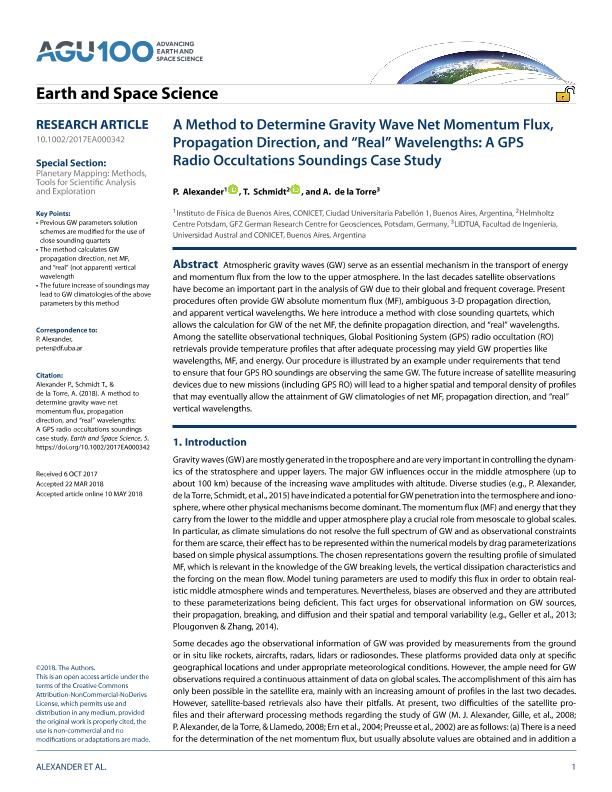Mostrar el registro sencillo del ítem
dc.contributor.author
Alexander, Pedro Manfredo

dc.contributor.author
Schmidt, T.
dc.contributor.author
de la Torre, Alejandro

dc.date.available
2020-01-14T20:04:02Z
dc.date.issued
2018-06
dc.identifier.citation
Alexander, Pedro Manfredo; Schmidt, T.; de la Torre, Alejandro; A Method to Determine Gravity Wave Net Momentum Flux, Propagation Direction, and “Real” Wavelengths: A GPS Radio Occultations Soundings Case Study; Wiley Blackwell Publishing, Inc; Earth and Space Science; 5; 6; 6-2018; 222-230
dc.identifier.issn
2333-5084
dc.identifier.uri
http://hdl.handle.net/11336/94674
dc.description.abstract
Atmospheric gravity waves (GW) serve as an essential mechanism in the transport of energy and momentum flux from the low to the upper atmosphere. In the last decades satellite observations have become an important part in the analysis of GW due to their global and frequent coverage. Present procedures often provide GW absolute momentum flux (MF), ambiguous 3‐D propagation direction, and apparent vertical wavelengths. We here introduce a method with close sounding quartets, which allows the calculation for GW of the net MF, the definite propagation direction, and “real” wavelengths. Among the satellite observational techniques, Global Positioning System (GPS) radio occultation (RO) retrievals provide temperature profiles that after adequate processing may yield GW properties like wavelengths, MF, and energy. Our procedure is illustrated by an example under requirements that tend to ensure that four GPS RO soundings are observing the same GW. The future increase of satellite measuring devices due to new missions (including GPS RO) will lead to a higher spatial and temporal density of profiles that may eventually allow the attainment of GW climatologies of net MF, propagation direction, and “real” vertical wavelengths.
dc.format
application/pdf
dc.language.iso
eng
dc.publisher
Wiley Blackwell Publishing, Inc

dc.rights
info:eu-repo/semantics/openAccess
dc.rights.uri
https://creativecommons.org/licenses/by-nc-sa/2.5/ar/
dc.subject
GRAVITY WAVES
dc.subject
MOMENTUM FLUX
dc.subject
REAL WAVELENGTHS
dc.subject.classification
Meteorología y Ciencias Atmosféricas

dc.subject.classification
Ciencias de la Tierra y relacionadas con el Medio Ambiente

dc.subject.classification
CIENCIAS NATURALES Y EXACTAS

dc.title
A Method to Determine Gravity Wave Net Momentum Flux, Propagation Direction, and “Real” Wavelengths: A GPS Radio Occultations Soundings Case Study
dc.type
info:eu-repo/semantics/article
dc.type
info:ar-repo/semantics/artículo
dc.type
info:eu-repo/semantics/publishedVersion
dc.date.updated
2019-10-22T17:38:56Z
dc.journal.volume
5
dc.journal.number
6
dc.journal.pagination
222-230
dc.journal.pais
Estados Unidos

dc.description.fil
Fil: Alexander, Pedro Manfredo. Consejo Nacional de Investigaciones Científicas y Técnicas. Oficina de Coordinación Administrativa Ciudad Universitaria. Instituto de Física de Buenos Aires. Universidad de Buenos Aires. Facultad de Ciencias Exactas y Naturales. Instituto de Física de Buenos Aires; Argentina
dc.description.fil
Fil: Schmidt, T.. German Research Centre for Geosciences; Alemania
dc.description.fil
Fil: de la Torre, Alejandro. Consejo Nacional de Investigaciones Científicas y Técnicas; Argentina. Universidad Austral. Facultad de Ingeniería; Argentina
dc.journal.title
Earth and Space Science
dc.relation.alternativeid
info:eu-repo/semantics/altIdentifier/url/https://agupubs.onlinelibrary.wiley.com/doi/full/10.1002/2017EA000342
dc.relation.alternativeid
info:eu-repo/semantics/altIdentifier/doi/http://dx.doi.org/10.1002/2017EA000342
Archivos asociados
